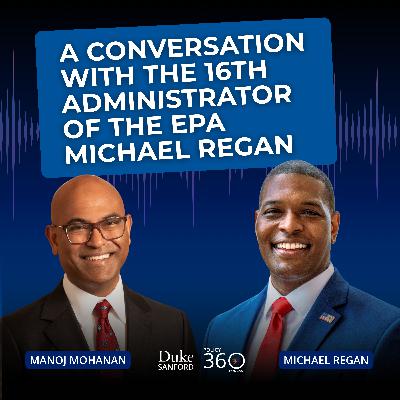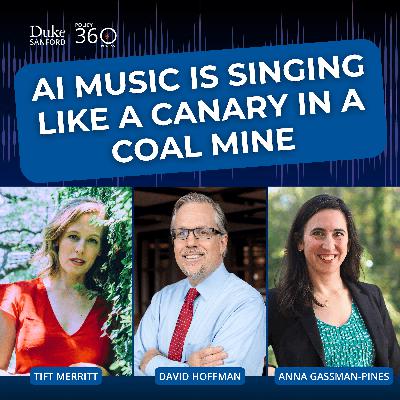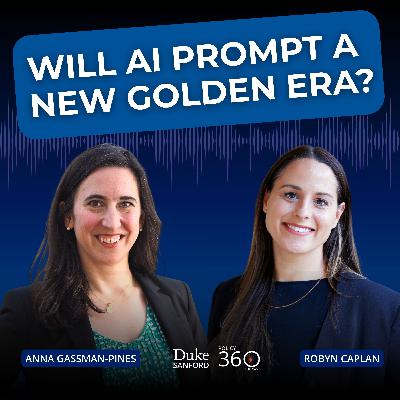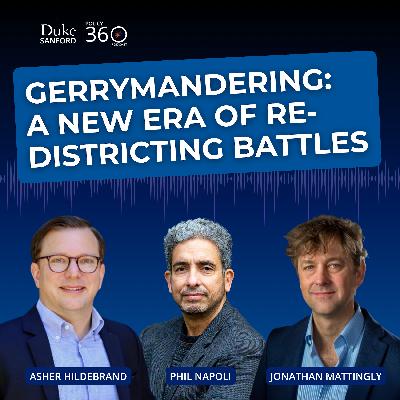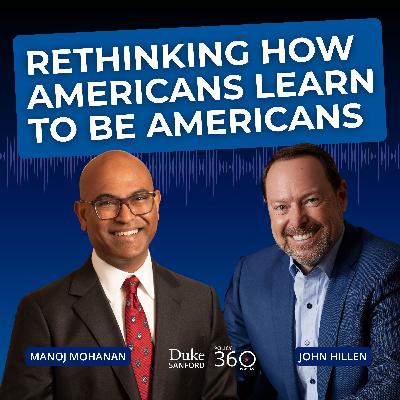Discover Policy 360
Policy 360

Policy 360
Author: Sanford School of Public Policy, Duke University
Subscribed: 127Played: 2,416Subscribe
Share
© copyright Duke University
Description
Policy 360 is a series of audio conversations from the Sanford School of Public Policy at Duke University. The series is hosted by Sanford's interim Dean Manoj Mohanan. Anna Gassman-Pines, Senior Associate Dean for Faculty Affairs, also hosts.
180 Episodes
Reverse
Danny Werfel recently served as the 50th Commissioner of the Internal Revenue Service. He led the U.S. tax system twice, and in his most recent stint he was in charge of a dramatic transformation, launching more digital solutions in a two-year period than in the previous two decades combined. Werfel joins us to talk about leadership, organizational change, and how a broader understanding of what the government does – and gets right – could have a profound impact on political polarization and democracy itself. Danny Werfel earned a Master of Public Policy degree at Duke, and is now serving as a distinguished fellow with Polis, Duke's Center for Politics.
What if a single clause in your job contract could quietly shape how much you are able to get paid -- after you leave that job? And what if that same contract clause ends up limiting the places you can move for a job? Today, the hidden power of the non-compete clause. New research from Matt Johnson, professor at the Sanford School of Public Policy at Duke University and co-authors gives insight into what the practice actually costs workers.
Michael Regan recently served as the 16th Administrator of the United States Environmental Protection Agency (EPA). Previously he was Secretary of the North Carolina Department of Environmental Quality where he secured the largest coal ash cleanup settlement in U.S. history. And he led negotiations on the cleanup of the Cape Fear River from PFAS contamination. Now he has taken a role at POLIS: Center for Politics at Duke University's Sanford School of Public Policy.
Every technology in music history leaves artists behind. What if one left them all behind? AI-generated music is severely undermining artists' ability to make a viable living. Is it a canary in the coal mine for music and for how AI will affect the future of work more broadly? Grammy-nominated musician Tift Merritt and Professor David Hoffman of the Duke Sanford School of Public Policy discuss the research they are conducting with students to address these issues. Host: Anna Gassman-Pines. This episode is part of a month-long series of stories related to tech policy from the Sanford School of Public Policy at Duke University.
Data centers hold computers and equipment that are the backbone of the digital age. They make possible the computational power and data storage needed to train AI models, store content, and operate the cloud-based services that many of us rely on. Some say that data centers and the innovations that come from them are key to solving huge issues facing the world right now, while others note major environmental concerns related to how they operate. However, a new report says data centers run by huge companies like Google called hyperscalers could actually be good for the environment in a key way - they could become mobilizers of clean energy and updated grids. Read the report. Guests: Merritt Cahoon and Ian Hitchcock from the Deep Tech at Duke Initiative. This episode is part of a month-long series of stories related to tech policy from the Sanford School of Public Policy at Duke University.
In this episode: from living under a bridge to building bridges between policy and practice, CJ Appleton's story is one of resilience, purpose, and possibility. Appleton is a new faculty member at the Sanford School of Public Policy at Duke University. After a rocky start to his academic career, including dropping out of college and becoming homeless, today he's eager to bridge the gap between criminology scholarship and US policy. His focus is on desistance, the process of ending a criminal career. Duke Sanford interim Dean Manoj Mohanan hosts. Read show notes/transcript at our website.
In this episode we'll explore AI – from deepfakes to the growing importance of social media verification. Our guest Robyn Caplan is an Assistant Professor at Duke's Sanford School of Public Policy and is currently teaching a class on the transformation of media. Her latest research considers the blue-check verification process that is used on many social platforms. Our host for this episode is Anna Gassman-Pines, Senior Associate Dean for Faculty Affairs in the Sanford School of Public Policy. Read show notes/transcript at our website.
States have increasingly come under pressure from President Trump to redraw district voting lines now even though they are traditionally redrawn every 10 years in response to the census. In response, Democratic strongholds like California are also taking steps to redraw maps out of cycle. Our guests today are both keeping a close eye on such "gerrymandering" efforts. Duke professor Jonathan Mattingly teaches a course on the topic and was involved in a gerrymandering challenge that went all the way to the US Supreme Court. Asher Hildebrand had a front row seat to the redistricting process as a longtime congressional staff member. He now teaches courses on American democracy and politics and directs the executive Masters of Public Affairs program at Duke. Our host for this episode is Phil Napoli, director of the DeWitt Wallace Center for Media and Democracy at Duke. Read show notes/transcript at our website.
Today's guest, John Hillen, says that only a third of native-born Americans can pass the citizenship test that American immigrants are required to pass. He is part of a new bipartisan commission trying to change that. The goal is to revitalize the teaching of American civics and history. Hillen served as US Assistant Secretary of State for Political-Military Affairs in the Bush administration among many other roles. He is now teaching at Duke University in the Master of National Security Policy program. He is also affiliated with POLIS: Duke's Center for Politics and The Duke Program in American Grand Strategy. He joins Manoj Mohanan, interim Dean of the Sanford School of Public Policy at Duke, to discuss the commission's work and American grand strategy more broadly. Read show notes/transcript at our website.
Recently, the U.S. has experienced several financial crises - all of them hard on American families. In 2008, over eight million Americans lost their jobs in the Great Recession. In 2020, unemployment was at 13 percent thanks to the COVID pandemic. By early 2025, the economy had recovered and unemployment had dropped back to the 4 percent range. Then sweeping new tariffs sent the stock market reeling. Vicki Bogan, who studies household finance, inequality and investment decision making, talks with Manoj Mohanan, Interim Dean of the Sanford School of Public Policy at Duke University, about what this latest financial shock might mean for families. Read show notes/transcript at our website.
The U.S. is a nation of immigrants, but we have a complex history on the topic. At times, the government has tried deporting large numbers of immigrants, with the goal of protecting the jobs and wages of native-born Americans. The current administration has announced plans to deport all undocumented immigrants, even some legal immigrants, as well as new travel bans. Hannah Postel researches the relationship of migration and economic development and provides a historical perspective on immigration deportations and restrictions. She talks with Anna Gassman-Pines, who leads faculty affairs at the Sanford School of Public Policy at Duke University. Read show notes/transcript at our website.
The price of housing has skyrocketed in recent years. Scholars estimate we are short between two and five million homes nationwide. Warren Lowell spent the last several years immersed in American housing policy as part of his PhD studies at the Sanford School of Public Policy at Duke University. For one study, he interviewed real estate developers and investors. He joins Sanford interim Dean Manoj Mohanan podcast to talk about what he learned. Read show notes/transcript at our website.
In the wake of the financial crisis of 2008, Congress established the Consumer Financial Protection Bureau, the CFPB. It protects Americans from predatory practices by consumer finance companies. The CFPB enforces federal laws and investigates fraud and abuse. It has sent over 6.8 million complaints to companies for resolution so far. The bureau has been targeted for massive cuts by the new administration which, thus far, have been blocked by a federal judge. Mallory SoRelle, a consumer finance expert and author of Democracy Declined: the Failed Politics of Consumer Financial Protection, talks with Manoj Mohanan, interim Dean of Duke's Sanford School of Public Policy, about the CFPB and what dismantling it could mean for Americans. Read show notes/transcript
What does it mean for the country that President Trump has signed an executive order to begin dismantling the Department of Education? Leslie Babinski, a researcher who focuses on education and former director of the Duke Center for Child and Family Policy talks about this extraordinary change with guest host Anna Gassman-Pines, Senior Associate Dean for Faculty Affairs in the Sanford School of Public Policy at Duke University. Read show notes/transcript.
What does it mean for democracy when a president owns a social platform, and is supported by others with major platforms of their own? Philip Napoli directs the DeWitt Wallace Center for Media and Democracy at Duke University and he joins Manoj Mohanan, interim public policy dean at Duke to discuss historical parallels to the connection between policy and media ownership, and regulation options. His book is called "Social Media and the Public Interest, Media Regulation in the Disinformation Age." Read show notes/transcript.
The new administration's interest in cold, snowy regions of the world might have come out of the blue to many Americans, but not to Tim Nichols. He leads the Duke University Sanford School of Public Policy Master of National Security Policy program – and he teaches about the growing strategic importance of Greenland and the broader Arctic. He joins Manoj Mohanan, interim public policy dean at Duke to discuss how melting ice is opening up international competition related to shipping and mineral drilling. Read show notes/transcript.
President Trump returns to the White House with his "America First" approach - a strategy critics say often comes at the expense of international alliances and multilateral commitments. Duke professor Susan Colbourn, a historian specializing in NATO, joins Manoj Mohanan, interim Dean of the Sanford School of Public Policy at Duke to discuss the topic. She's the author of Euromissiles: The Nuclear Weapons That Nearly Destroyed NATO, and is associate director of the Duke Program in American Grand Strategy. Read show notes/transcript.
It's no secret that Americans' ability to engage in meaningful conversations across political, cultural, and ideological divides feels more strained than ever. In this episode, we discuss how to bring people together. Two words: civil discourse. Duke professor Abdullah Antepli is a nationally recognized expert in civil discourse. Recently he's been teaching a course on the topic and is creating public forums for dialogue between people with opposing views. Antepli leads Polis, Duke's Center for Politics. He talks with Manoj Mohanan, interim Dean of the Sanford School of Public Policy at Duke. This episode is part of a series of election-related conversations.
Could political polarization be addressed by something very simple – getting to know each other better? David Brooks argues that polarization stems from an urgent need for connection. "There are connections between seeing others and strengthening our communities and in turn, democracy," he says. Brooks is an opinion columnist for the New York Times. He appears regularly on the PBS NewsHour, NPR's All Things Considered, and NBC's Meet the Press. His new book is titled, How to Know a Person, the Art of Seeing Others Deeply and Being Deeply Seen. This episode is part of our ongoing series of election-related conversations. Guest host: Alison Jones of the DeWitt Wallace Center for Media and Democracy at Duke University.
In this episode of Policy 360, Duke Professor Bill Adair joins us to discuss lying in politics. Adair founded the Pulitzer Prize-winning fact-checking organization PolitiFact. His new book, Beyond the Big Lie, explores how and why politicians lie, which party does it more, and what can be done about it. This episode is part of our ongoing series of policy-focused conversations related to the 2024 election. Guest host: Phil Napoli, Director of the DeWitt Wallace Center for Media and Democracy at Duke University.




